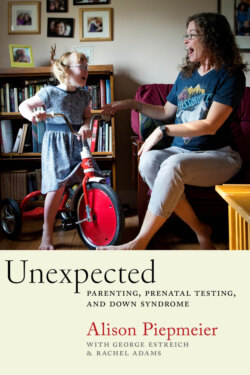Unexpected

Реклама. ООО «ЛитРес», ИНН: 7719571260.
Оглавление
Alison Piepmeier. Unexpected
Unexpected
Unexpected. Parenting, Prenatal Testing, and Down Syndrome
Contents
Preface
1 “I Wouldn’t Change You If I Could” Disability as a Form of Human Diversity
2. The Inadequacy of “Choice” Disability, Feminism, and Reproduction
Feminist Narratives
Parental Stories
Reproductive Justice
3. The Welcome Table
4. Saints, Sages, and Victims. Down Syndrome and Parental Narrative
The Genre
Memoirs as Sites of Dehumanization
Memoirs as Sites of Resistance
5. Accessible Words. Alison Piepmeier and the Boundaries of Disability
I
II
III
6. Six Questions on the Special, the Inclusive, and the Universal
Acknowledgments
Individual Acknowledgments
Notes. Preface
1. “I Wouldn’t Change You If I Could”
2. The Inadequacy of “Choice”
3. The Welcome Table
4. Saints, Sages, and Victims
5. Accessible Words
6. Six Questions on the Special, the Inclusive, and the Universal
Bibliography
Index
About Alison Piepmeier
About George Estreich and Rachel Adams
Отрывок из книги
Alison Piepmeier
with George Estreich and Rachel Adams
.....
In leaving us her manuscript and notes, Alison joins a group of important thinkers who left unfinished work for friends and colleagues to complete. At one point, Rachel collected a list that included such figures as the poet T. S. Eliot, author Ralph Ellison, and critics F. O. Matthiessen, Michel Foucault, Jacques Derrida, Edward Said, Raymond Williams, and Walter Benjamin. The company becomes more diverse with the inclusion of more recent authors like the poet Gary Fisher and cultural critics Chris Bell, Patricia Yaeger, Barbara Johnson, Lindon Barrett, Linda Singer, and William Hawkeswood.
We take a certain comfort in knowing that the challenges we face as editors have been shared by the editors and collaborators on these earlier projects. In Alison’s case, the inclusion of personal narrative presents us with special challenges: even as co-authors, we do not claim to speak for Alison; we hope that Alison speaks with our help. We are her assistive technology. In this role, we see a partial parallel with the work of parents who speak for their children—and the same ethical conundrums, the shadings of which are implied by prepositions: speaking for, speaking about, speaking over, speaking with. We have tried to speak with Alison or, rather, to let her speak through us—to preserve as much of her agency, her intentions, as we could. Paradoxically, to do so means alteration: collaborating with Alison requires a sort of editorial séance, a conjuring of the Alison we knew. Imagining her, to imagine whether she would approve of a particular change. Would she want this? Would she say this, and would she say this in this way?
.....